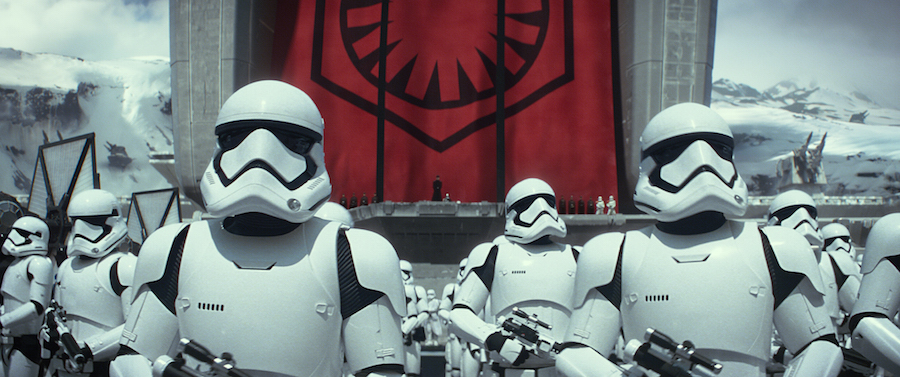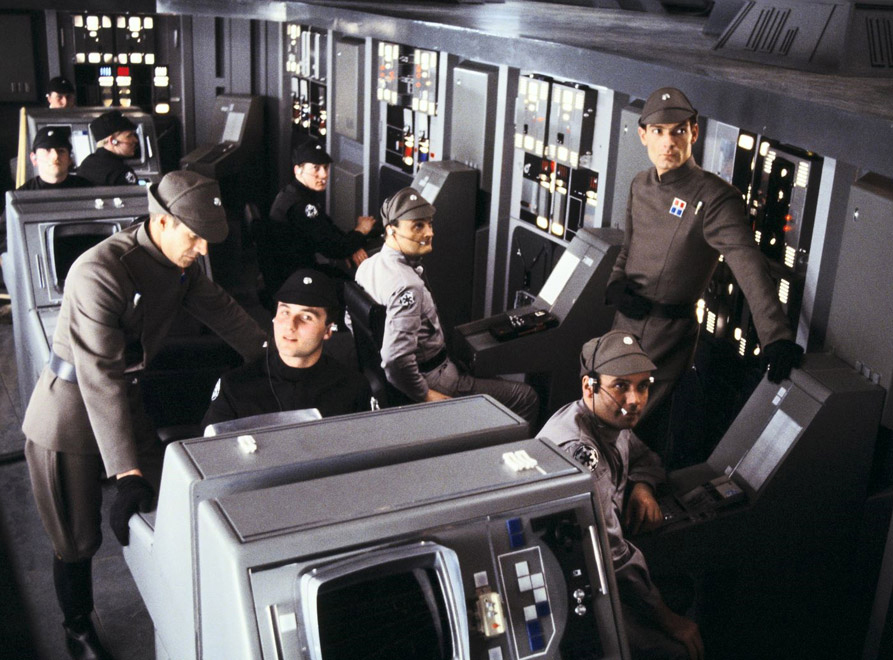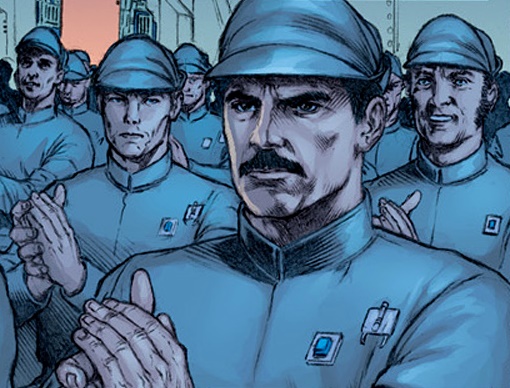
It has to be said, of all the effects I could perhaps consider The Force Awakens having on the Star Wars fanbase, this wasn’t on the list. Yet it’s become something of a thing fairly quickly.
The basis of it is simple: The Empire clearly did not honour its post-Battle of Jakku treaty obligations. Instead it went and constructed new weaponry of mass destruction in the form of the Starkiller and killed billions of New Republic citizens. Therefore, the New Republic should never have signed the treaty and spared the Empire (the New Republic will be referred to as just the Republic from this point on). Thus: No Empire = No First Order = No Starkiller = No billions dead.
The problem is what the ‘no Empire’ part would have committed the Republic to. It would amount to killing millions, maybe billions on the basis of a fantastical superweapon way off in the future. Now, that could be done, but if it were? The Republic would no longer be the Republic, indeed, in quite literally killing the Empire they would have become it!
There’s a great line in the Legends New Jedi Order book Dark Tide II: Ruin for Wedge Antilles: “hindsight criticism is always based on fantasy foresight.”

Some things are always going to be beyond the pale. No matter what may happen, you can never opt for any of those things and remain untainted afterwards. It’s the ‘you can never use torture’ view, too many people like to say: “But I can if a terrorist knows where a bomb is!” Really? And the individual you have just so happens to have this knowledge? My, that’s very neat, real life tends to be far messier. Chances are, after you’ve gone Jack Bauer on this suspect, you’ll have a very messy room, possibly a corpse and little in the way of actionable intelligence. A basic concept of military operations is you cannot divulge, even under torture, that which you do not know. The ‘good guys’ should know this, the bad guys certainly do.
Similarly, attempting to kill an idea by killing everyone that subscribes to it? Not even Jacen Solo in his maddest undertakings as Darth Caedus would buy this. Yet the belief is there that this was merely all the Republic had to do. Let’s say, somehow, by the most insane abuse of reasoning, this did happen. After the Battle of Jakku, the Republic systematically kills every Imperial citizen regardless of age, gender or race. It takes a long time and there’s always stragglers but the Republic is applying Mafia rules – any surviving Imperial can return to seek vengeance, therefore all must die. Say a decade later, it is done, the Empire is indeed a corpse. Victory!
…Or not? After all, the Imperials are in the history books. Everyone knows what they are and some are susceptible to them. Clearly the only response is to purge this hidden column of Imperial wannabes and outlaw any positive depiction of the Empire. Yet not even that will be entirely effective for, as the Nazis have demonstrated decades after their defeat, evil retains an allure of fascination. Even if they are depicted as total baby-killing bastards, still some will be drawn to their banner. Stronger measures are needed – the Empire must be erased from history lest anyone seek to revive it. Chances are good, however, that this measure will fail too. So the Republic, in the name of preventing the return of the Empire, will become every bit as restrictive and controlling as it.

Overlooked of course, in the flow of all this fire and brimstone rhetoric, is the true nature of a civil war. Every member of the Rebellion, in one form or another, started off as an Imperial citizen. Ah, but they rebelled didn’t they? So, is that sufficient to protect them from death for knowing of the Empire? Sure, some fought it covertly right from the start, but that is not the accusation. The crime is knowledge of the Empire, the sentence is death!
One of the biggest effects of the World Trade Center attacks in 2001 has been the corruption of political ideals, which were cast aside in the name of expediency. The attacks were not due to a lack of power but of imagination, no one really considered it possible until it had happened. The very idea that a group would murder hundreds to kill thousands did not arise, even in the most vicious war-game scenario. Similarly, that a load of ex-Imperial hardliners would somehow construct in an unknown region of space, over decades, weaponry that dwarfs the destructive ability and range of the Death Stars. Should the response to either be that those ideals are cast away? In which case, what did the victims die for?
Politicians seem to love the language of war. Why not? It’s simple and it reduces things down to binary opposites in response to the complexity of life. It also takes reality and distorts it into a world of spectres of annihilation, of evil hordes – that in order to combat such, emergency powers are needed – does this sound familiar perhaps? Whatever else the prequels did, they did also neatly puncture the War on Terror ideology via the proxy of the Clone Wars.
The one aspect of this that I think could work is not the idea of a retrospective, hindsight-generated genocide from all-knowing viewers, but of the Republic being enraged beyond reason by the Starkiller’s planetary obliteration. It is suspected that the First Order will invade in Episode VIII, which has a plausibility to it, as the Republic will be chaotic and vulnerable. Yet what if the Republic has a hitherto unknown level of resilience? What if, alongside the idealism that saw the military be reduced post-Battle of Jakku, there was an equally cynical plan for survival in the face of immense destruction? A plan constructed in the shadows of the Death Stars? In which case there may be a very nasty surprise waiting for the First Order.
If there is – and the Republic gains the edge on the First Order – what then? It is one thing to fight your enemy, to exhaust their material resources and break their will to continue. It is one thing to accept the surrender of such an adversary. It would be quite another to do both of those and then execute every member of it! It would be the Empire’s final victory over the Republic.

There is another political dimension restricting the Republic’s ability to wage ceaseless war against the Empire – the fear that the galaxy might revert to the Clone Wars. The New Republic doesn’t just have to fix the problems of the Empire; it needs to fix the problems of the Old Republic that led to the Empire in the first place.
Hence, the “Supreme Chancellor” is now just the “Chancellor.” The capital world is not fixed, but migrates to new planets in order to prevent an over-accumulation of bureaucratic power in the Core Worlds. The major corporations are excluded from Senatorial posts. And the military is severely reduced, with much responsibility handed over to the individual planets for self-defense. Sure, a strong executive in a fixed capital with a huge fleet backed by mega-corporations would be conducive to fighting the empire, but all of those things are what provoked the Clone Wars in the first place (well, those, and a Sith conspiracy). Once the military power of the Empire was broken at Endor and Jakku, preventing a renewed Separatist movement became a far greater priority than physically eradicating every trace of the Empire.
I like the idea that the New Republic pursued a political program aimed primarily at fixing the problems of the Old Republic. I think it makes the good guys all the more heroic.
Of course, it also sounds like the leaders of the New Republic became pretty dumb, pretty fast. After all, preventing the construction of Starkiller probably wouldn’t have required mass murder of every neo-Imperial in the galaxy. Were there no attempts to verify that the rump Empire and its militant First Order offshoot were abiding by their arms control commitments? During the Cold War, the United States and the Soviet Union monitored each others’ weapons programs via satellite to ensure that the neither side was cheating on arms control agreements. Yet the New Republic seems to have written off warnings from Leia Organa and others that the First Order might be in material breach of the arms control provisions of the Galactic Concordance.
Although I respect the New Republic’s desire to avoid the pitfalls of the Old Republic, it seems odd that within a generation the leaders of the New Republic would become so complacently blind to the continued threat posed by the Empire. Not impossible, (see: https://en.wikipedia.org/wiki/German_re-armament), but still pretty odd.
Always enjoy reading your comments John, though I think the legacy of the Clone Wars and the New Republic is an entirely separate article. (Just as it’s unclear what knowledge there is of Vader’s identity, so too do we not know if the truth of Sidious’ plots became known.)
The other problem right now is so little is known of those years in-between, something I hope Bloodline will remedy to a degree. As it is, I opted for something that was an unimaginable quantum leap in the absence of anything better.
That said, I dislike the sledgehammer subtlety apparently being displayed in TFA. I suppose it could be mitigated by the expansion of the civil war into a much bigger conflict, so making a WW1 parallel work. Much of the reluctance to go to war in the late thirties was due to that war being so incredibly destructive. But I don’t think any such aspect has been added to the new SW yet.
I’m also looking forward to future inter-VI/VII material. Although I’m glad that VII wasn’t weighed down with an extended political plotline, I’m also interested to see how politics developed post-Endor. I could definitely imagine a generational divide between those rebels like Mon Mothma who were old enough to remember the Clone Wars (which as WWI-level destructive) and the younger rebels like Leia whose formative experiences were under the Empire, and who would perhaps have a more militant “never again” attitude. Perhaps the end of the Empire allowed former Separatists like Rush Clovis and Lux Bonteri to re-enter politics, with different perspectives from those who had participated in rebellion. I bet that the Nemoidians (to pick one “victim” of the Clone Wars) and the Alderaanians (at least, what’s left of them) would have very different views on how the New Republic ought to be structured.
It will be interesting to see how the new canon deals with general knowledge about Palpatine and Vader’s identities. However, the Old Republic of the Prequels had numerous political problems that Sidious was able to exploit, but did not create (I think that the Clone Wars TV show did a good job at certain points of including these problems). It seems logical to me that the New Republic would have to deal with these problems, as well as those caused by the Empire. For what it’s worth, the Visual Dictionary has a little blurb saying that the roving capital concept was intended to “convince the many disaffected systems that had tried to withdraw from the Republic prior to the Clone Wars” (66). That said, I agree that it’s still very much an issue that is in development; I guess we’ll just have to see how it plays out!
As always, I enjoy your work immensely, and I look forward to your piece on the Clone Wars and the New Republic 🙂
I think the nod to German re-armment is fantastic. As I was reading this article, I thought of the first volume of Churchill’s history of WWII – “The Gathering Storm”. It’s all about Churchill grousing and complaining about Germany ignoring their peace treaties and the like.
A lot of the side material makes it sound like there was corruption in the Senate that prevented the First Order from being properly monitored… that Leia’s warnings were repeatedly ignored either out of a Pollyannaesque hope or simply being bought.